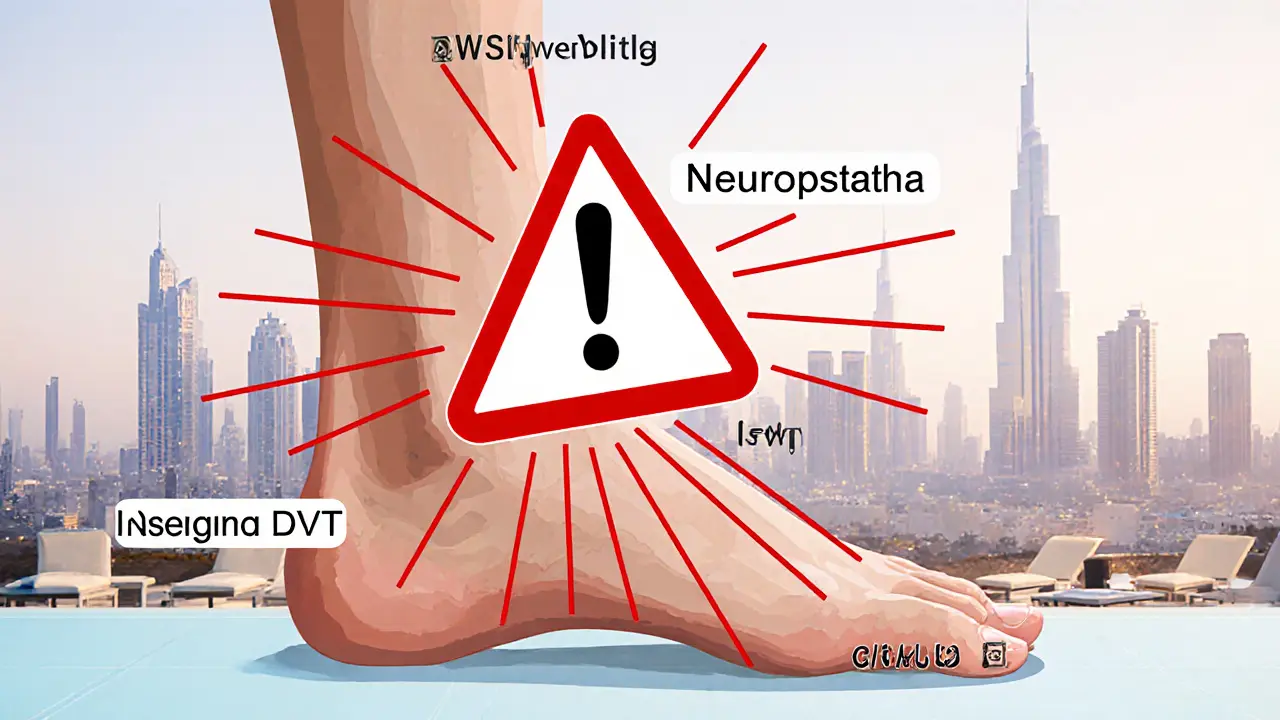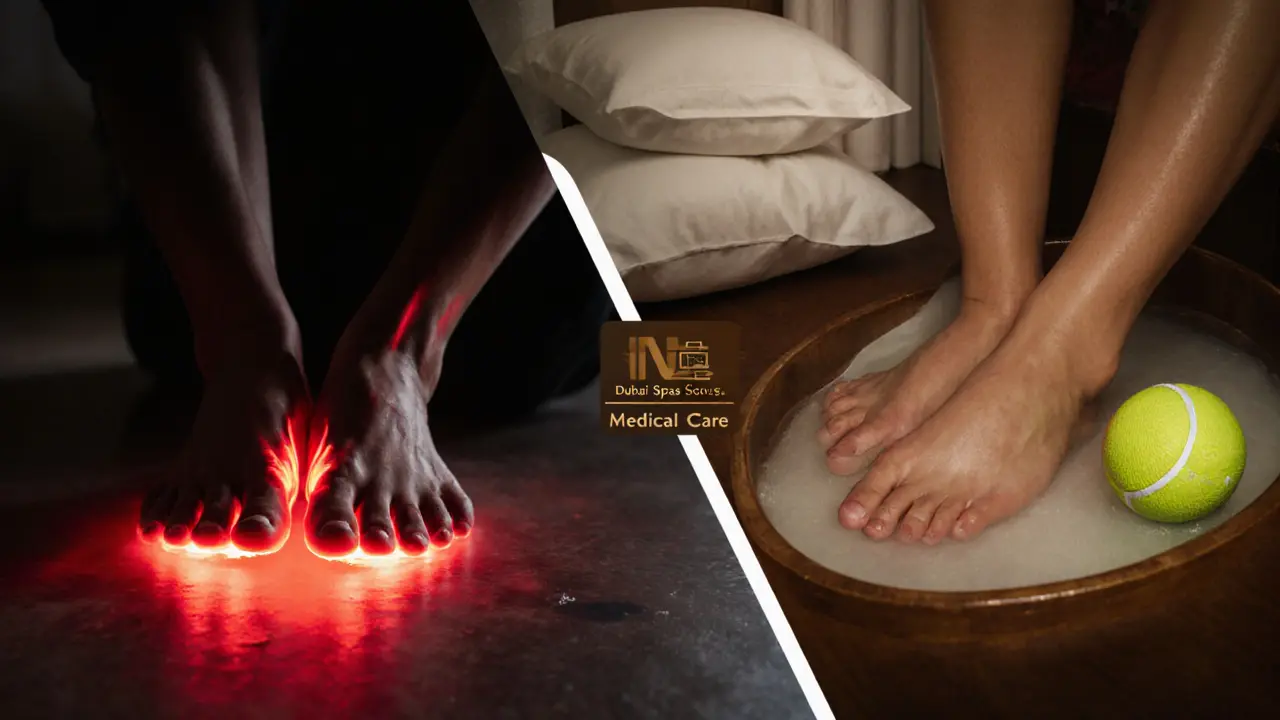You’ve seen the ads: relaxing foot massages in luxury spas across Dubai, with warm oils, soft music, and feet soothed like they’ve never been touched before. It sounds perfect-until you realize it might not be safe for you. Not everyone benefits from a foot massage. In fact, for some people, it could do more harm than good. If you’re thinking about booking one in Dubai, you need to know who should skip it-before you lie down on the table.
Who Should Avoid Foot Massage?
Foot massage isn’t just a luxury-it’s a form of therapy. That means it interacts with your body’s systems: circulation, nerves, lymph flow, even your blood pressure. What feels amazing to one person could trigger a dangerous reaction in another. If you have any of these conditions, talk to your doctor before booking a session.
- Recent foot or leg surgery-Your tissues are still healing. Pressure, even gentle pressure, can disrupt stitches, increase swelling, or cause internal bleeding.
- Deep vein thrombosis (DVT)-This is a blood clot in a deep vein, usually in the leg. Massaging the area could dislodge the clot, sending it to your lungs. That’s a medical emergency.
- Severe peripheral neuropathy-If you can’t feel your feet properly (common in uncontrolled diabetes), you won’t know if the pressure is too hard. You could bruise, blister, or damage tissue without realizing it.
- Active infections or open wounds-A fungal infection like athlete’s foot, a cut, or an ulcer on your foot? The massage could spread bacteria or irritate the area, making it worse.
- Uncontrolled high blood pressure-Foot massages can cause a temporary drop in blood pressure. For someone already struggling with hypertension, that drop might lead to dizziness, fainting, or worse.
- Pregnancy in the first trimester-Some reflexology points on the feet are linked to uterine contractions. While there’s no solid proof it causes miscarriage, most practitioners avoid these points during early pregnancy as a precaution.
- Severe osteoporosis-Fragile bones can crack under pressure. Even light foot massage could cause micro-fractures in the foot bones if your bone density is very low.
If you’re unsure, ask yourself: Has my doctor ever warned me not to apply pressure to my legs or feet? If yes, don’t skip the consultation-get clearance first.
Why This Matters in Dubai
Dubai has over 300 spas offering foot massage, from five-star hotel retreats to mall-based salons. Many of them advertise “deep tissue,” “reflexology,” or “Ayurvedic” treatments. But not all therapists are trained to recognize medical red flags. Some assume if you’re not screaming, you’re fine. That’s dangerous.
One case from a Dubai clinic in 2024 involved a 68-year-old man with undiagnosed DVT. He got a foot massage after a long flight, thinking it would help his swollen feet. Within hours, he had trouble breathing. He was rushed to the hospital-his clot had traveled to his lungs. He survived, but barely.
That’s why knowing your own limits matters more here than anywhere else. In a city where wellness is a industry, safety often gets buried under luxury packaging.
What Happens During a Foot Massage in Dubai?
A typical session lasts 30 to 60 minutes. You’ll sit in a reclining chair, feet soaked in warm water with Epsom salts or essential oils. Then the therapist uses thumbs, knuckles, or tools to apply pressure to your soles, arches, and toes. Reflexology claims these spots connect to organs-like the liver, heart, or lungs. While that’s not scientifically proven, the relaxation response is real.
Most places in Dubai use a mix of Swedish massage, acupressure, and reflexology. The pressure varies: some are gentle, others go deep. Always speak up if it hurts. Pain isn’t “working.” It’s a warning.

What to Do Instead If You Can’t Get a Foot Massage
Just because you can’t get a foot massage doesn’t mean you can’t relax. Try these safe alternatives:
- Warm foot soak-Just water, Epsom salt, and a few drops of lavender oil. Soak for 15 minutes. No pressure needed.
- Foot rolling-Use a tennis ball or a textured roller under your foot while sitting. Gentle, controlled, and you’re in charge of the pressure.
- Leg elevation-Prop your feet up on a pillow for 10-15 minutes. Helps with swelling without any risk.
- Light calf stretches-Stand facing a wall, press your hands against it, step one foot back, and gently press your heel down. Hold for 30 seconds. Repeat.
These are safe, effective, and free-or nearly so. No therapist needed.
Foot Massage vs. Medical Foot Care in Dubai
| Aspect | Foot Massage | Medical Foot Care |
|---|---|---|
| Who provides it? | Spa therapists, reflexologists | Podiatrists, licensed medical professionals |
| Training required | Short certification (often 2-4 weeks) | University degree + medical license |
| Can diagnose conditions? | No | Yes |
| Can treat infections? | No-can make them worse | Yes |
| Best for | Relaxation, stress relief | Diabetes, neuropathy, bunions, heel pain |
| Cost (Dubai) | AED 120-350 per session | AED 300-800 (consultation + treatment) |
Foot massage is for comfort. Medical foot care is for health. Don’t confuse the two. If your feet are numb, swollen, discolored, or painful, see a podiatrist-not a spa therapist.

How to Choose a Safe Foot Massage in Dubai
If you’re cleared for a foot massage, here’s how to pick a safe provider:
- Ask if they’re certified by the Dubai Health Authority (DHA). Licensed spas display this visibly.
- Check reviews on Google or TripAdvisor. Look for mentions of “medical conditions” or “asked about health.”
- Call ahead and ask: “Do you screen clients for contraindications like diabetes or blood clots?” If they say no, walk away.
- Choose a clinic over a mall kiosk. Clinics are more likely to have trained staff and proper hygiene.
- Never let them massage swollen, red, or hot feet. That’s a sign of infection or inflammation.
Top-rated places like Al Nisaa Spa in Jumeirah or The Body Shop Dubai Mall have trained staff who ask health questions before starting. Don’t be shy-your safety matters more than their sales pitch.
Frequently Asked Questions
Can I get a foot massage if I have diabetes?
Only if your diabetes is well-controlled and you have no nerve damage or open wounds. Even then, go to a clinic that specializes in diabetic foot care. Avoid deep pressure-gentle strokes only. Always check your feet afterward for redness or swelling.
Is foot massage safe after a long flight?
It depends. If you’ve been sitting for over 8 hours, your legs might be swollen from poor circulation. A gentle foot massage can help-but avoid deep pressure on the calves. If you’re at risk for blood clots (over 50, on birth control, or have a history of DVT), skip it. Walk around instead.
Can foot massage help with plantar fasciitis?
Light pressure on the arch might ease tension, but aggressive massage can make plantar fasciitis worse. For lasting relief, see a podiatrist. They’ll recommend stretches, orthotics, or night splints-not just a massage.
Are foot massages safe during pregnancy?
After the first trimester, yes-provided the therapist avoids certain reflexology points linked to labor. Always inform them you’re pregnant. Many Dubai spas offer prenatal foot care with modified techniques.
What if I feel dizzy after a foot massage?
That’s a red flag. It could mean your blood pressure dropped too fast, or you’re dehydrated. Drink water, sit down, and don’t drive. If it happens again, stop foot massages and talk to your doctor. It’s not normal.
Final Thought: Relax, But Don’t Risk It
Foot massages in Dubai are beautiful, luxurious, and deeply relaxing-for the right people. But wellness shouldn’t come at the cost of your health. If you’re unsure whether it’s safe for you, don’t guess. Ask your doctor. Take five minutes to check your own feet: are they swollen? Numb? Red? If so, skip the massage. Your body is giving you signals. Listen.
There’s no shame in saying no. The best massage is the one you can enjoy without worry.







November 2, 2025 AT 16:19
So many people in Dubai just assume 'wellness' means 'safe'-but this post is a wake-up call. I had a friend get a massage after a long flight and ended up in the ER. No one asked her about her medical history. Just smiles, oils, and zero screening. It’s scary how little training some therapists have.
I’ve been to a few spas here and always ask upfront if they screen for DVT or neuropathy. Only one said yes. The rest acted like I was ruining the vibe. Your body knows when something’s off-listen to it.
Also, if you’re diabetic, don’t let them 'go deep.' Gentle is enough. Your feet are telling you things you might not feel anymore. Don’t let a $150 massage be the thing that breaks you.